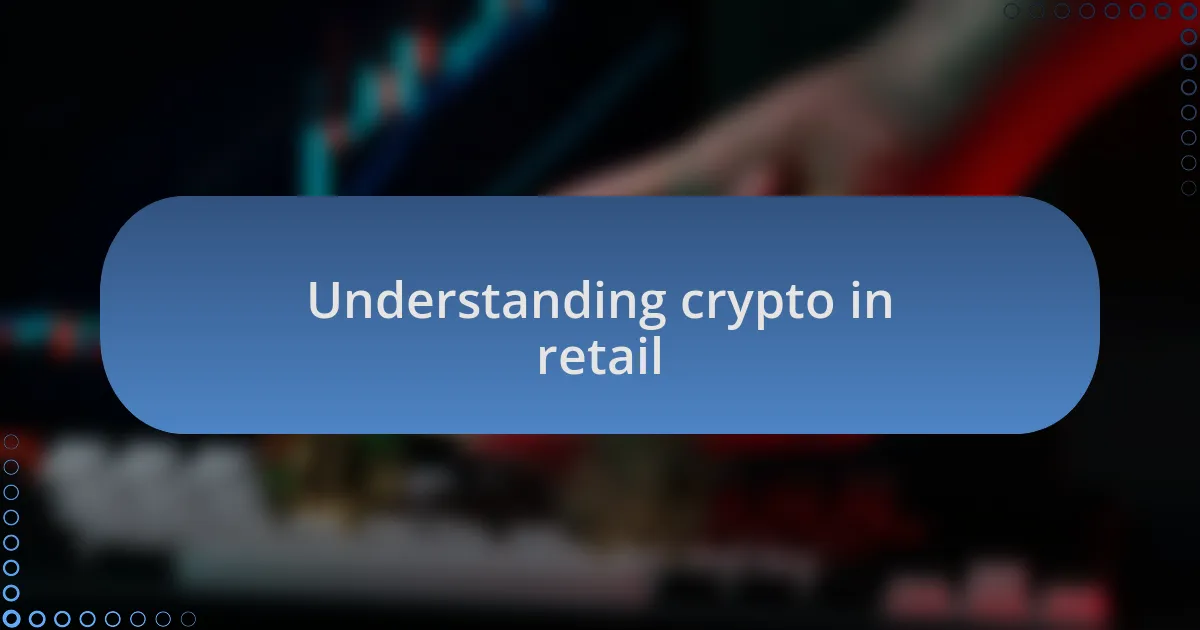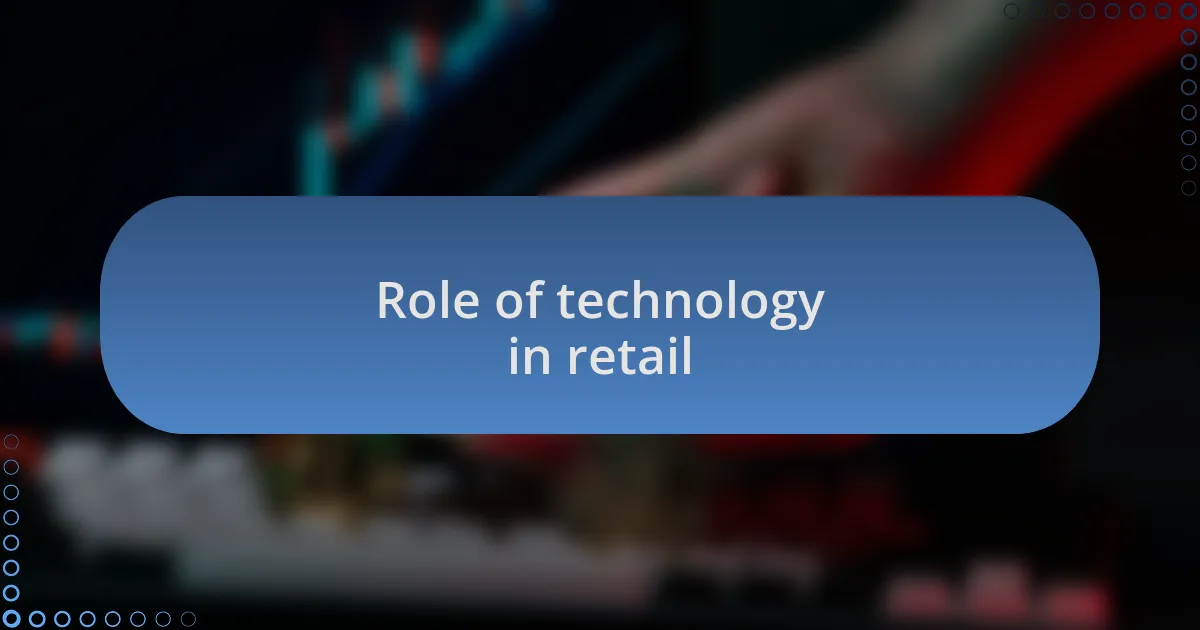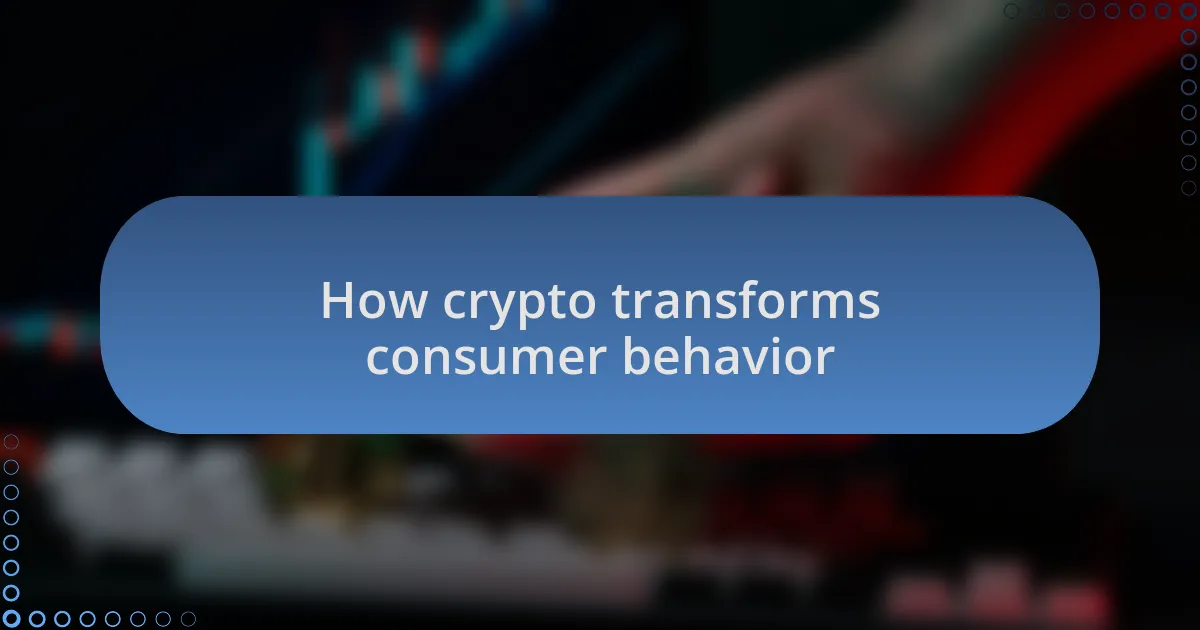Key takeaways:
- Cryptocurrencies are revolutionizing retail by enabling faster transactions with lower fees, enhancing consumer experience and reducing costs for retailers.
- Crypto analysis engines provide vital data insights that help retailers navigate market volatility, optimizing their strategies and decision-making processes.
- Technology, including blockchain, AI, and e-commerce, is transforming retail by improving customer understanding, enhancing transparency, and expanding market reach.
- Cryptocurrency encourages new consumer behaviors, offering anonymity and fostering community among users, which shifts purchasing habits and expectations.

Understanding crypto in retail
Crypto in retail is transforming the way consumers and businesses interact. I remember my first experience using Bitcoin to buy a small item online. The thrill I felt, knowing I was participating in something revolutionary, was palpable. It made me realize just how much potential cryptocurrencies hold in creating new channels for commerce.
Understanding crypto is crucial in a retail environment where speed and security are paramount. Have you ever been frustrated by long transaction times or high fees with traditional banking methods? With cryptocurrencies, I’ve noticed that transactions can often occur almost instantly, with minimal fees. This efficiency not only enhances the customer experience but can also significantly reduce costs for retailers.
Moreover, the integration of blockchain technology offers more than just a payment method; it fosters transparency and trust. Imagine a world where you can verify the authenticity of a product directly through its blockchain record. This potential to build customer confidence is something I find incredibly exciting, as it changes the dynamics of how we shop and engage with brands.

Importance of crypto analysis engines
The significance of crypto analysis engines in the retail sector cannot be overstated. In my experience, navigating the complexities of cryptocurrencies requires tools that can sift through vast amounts of data and discern meaningful trends. Have you ever wondered how investors and retailers make smart decisions in such a volatile market? That’s where these engines shine, as they provide the analytics necessary to understand market dynamics and optimize strategies.
When I think about my own investments, I realize how essential it is to have real-time insights. Crypto analysis engines empower retailers by enabling them to track price fluctuations and market sentiment continuously. This capability not only protects against potential losses but also opens doors for profitable opportunities. Imagine being able to make informed purchasing decisions based on data analytics instead of sheer guesswork—it’s a game changer.
Lastly, the ability to predict market trends using advanced algorithms transforms how retailers strategize future initiatives. I remember a time when a well-timed sale based on market insight led to an influx of customers for me. It’s moments like these that highlight how vital these tools are in today’s competitive landscape, making them not just valuable but essential for anyone involved in retailing with cryptocurrencies.

Role of technology in retail
Technology shapes the retail landscape in profound ways. In my experience, tools like artificial intelligence and machine learning have redefined how retailers understand their customers. Have you ever considered how a simple recommendation engine can turn a casual browser into a loyal customer? It’s fascinating to think that data-driven insights can lead retailers to curate personalized shopping experiences that resonate on an emotional level.
Moreover, the rise of e-commerce fueled by technological advancements has expanded the reach of retailers beyond geographical boundaries. I remember the excitement I felt when I first successfully launched an online store. It was exhilarating to think that my products could now be available to anyone, anywhere, at any time. This shift not only opens up new markets but also facilitates direct communication, allowing businesses to gather feedback and adapt more swiftly to consumer needs.
I can’t help but think about the implications of blockchain technology in retail as well. It’s not just about cryptocurrencies; it’s about transparency and trust. When I see retailers leveraging blockchain to verify the authenticity of products, I feel more confident making purchases. Isn’t it reassuring to know that technology can safeguard our interests and enhance our shopping experiences? Ultimately, technology’s role in retail is not merely supportive; it’s transformative, pushing the industry into a new era of efficiency and customer interaction.

How crypto transforms consumer behavior
Cryptocurrency is reshaping consumer behavior by offering new methods of payment that some find more appealing than traditional methods. I’ve noticed a growing trend where customers appreciate the speed and low transaction fees associated with crypto. Can you imagine making a purchase without the hassle of bank delays? This immediacy often translates into higher conversion rates, demonstrating how consumers are adapting their preferences and expectations.
Additionally, the anonymity that cryptocurrencies provide seems to create a sense of security for buyers. There’s something almost liberating about knowing that your transaction details won’t lead back to you. In my own experience, this fundamental shift toward privacy has encouraged me to explore purchases that I might have otherwise hesitated to make. The fact that more retailers are now accepting cryptocurrency reflects this changing mindset.
Moreover, using crypto can foster a sense of belonging among consumers, creating a community of like-minded individuals advocating for decentralization and digital currencies. I remember attending a local event where members shared their experiences using crypto in retail. It was electrifying to see the passion in the room just from discussing how digital currencies could upend traditional retail norms. This shared enthusiasm shows how crypto is not only altering purchasing habits, but also uniting consumers around a common cause.

My observations on crypto applications
Observing the rise of crypto applications in retail, I’m struck by the unique opportunities they present. For instance, I recall a time when I used a blockchain-based loyalty program at a local café. Instead of traditional points, I earned digital tokens that I could use for future purchases or even trade for other rewards. This not only made my loyalty feel more tangible, but it also added an exciting layer of engagement that traditional programs often lack. Isn’t it fascinating how something as simple as a coffee can evolve into a rewarding crypto experience?
One application that really caught my attention is the integration of decentralized finance (DeFi) into retail ecosystems. I often find myself pondering the possibilities when I consider how retailers begin to offer lending options right at the checkout. Imagine being able to finance a larger purchase instantly, using crypto without jumping through the hoops of traditional credit checks. It’s a thrilling concept that could empower consumers, sparking curiosity about the broader implications for financial inclusion.
Furthermore, I’ve observed a surge in the use of non-fungible tokens (NFTs) by brands for exclusive product launches. I vividly remember feeling a rush of excitement when a brand I admire released a limited edition sneaker collection tied to NFTs. The idea of owning a unique digital asset alongside the physical product was exhilarating and has left me wondering—could this be the future of brand loyalty? Integrating crypto in such innovative ways truly exemplifies harnessing technology to enhance consumer experiences, and I’m eager to see how this plays out in the retail landscape.